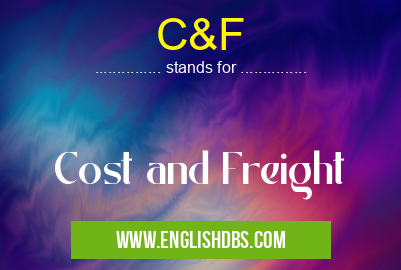What does C&F mean in TRANSPORTATION
C&F (Cost and Freight) is a trade term used in international commerce to indicate that the seller is responsible for the cost of the goods and the freight charges up to a specified destination.

C&F meaning in Transportation in Governmental
C&F mostly used in an acronym Transportation in Category Governmental that means Cost and Freight
Shorthand: C&F,
Full Form: Cost and Freight
For more information of "Cost and Freight", see the section below.
Meaning in GOVERNMENTAL
In the context of government procurement, C&F may refer to the procurement method where the supplier is responsible for delivering the goods to a specified destination, including the cost of transportation and insurance but excluding the import duties and taxes.
Full Form
- C: Cost (of the goods)
- F: Freight (charges)
What does C&F stand for?
C&F stands for Cost and Freight, which implies that the seller is responsible for the cost of the goods and the freight charges up to a specified destination.
Essential Questions and Answers on Cost and Freight in "GOVERNMENTAL»TRANSPORTATION"
What does C&F stand for?
C&F stands for Cost and Freight. It is an international trade term that indicates the seller's responsibility for the cost of the goods and the freight charges to deliver the goods to a specified port of destination.
What does the seller do under a C&F contract?
Under a C&F contract, the seller is responsible for:
- Procuring the goods
- Arranging for the export clearance of the goods
- Arranging and paying for the freight charges to the specified port of destination
- Delivering the goods on board the vessel at the port of shipment
- Providing the buyer with the necessary documents, such as the commercial invoice, packing list, and bill of lading
What are the buyer's responsibilities under a C&F contract?
The buyer's responsibilities under a C&F contract include:
- Paying the price of the goods
- Arranging for the import clearance of the goods
- Taking delivery of the goods at the port of destination
- Paying any additional charges, such as customs duties or port charges
When does the risk of loss or damage to the goods pass from the seller to the buyer under a C&F contract?
The risk of loss or damage to the goods passes from the seller to the buyer when the goods are delivered on board the vessel at the port of shipment.
What are the advantages of using a C&F contract?
The advantages of using a C&F contract include:
- The seller assumes the responsibility for the freight charges, which can be beneficial for the buyer if the freight charges are high.
- The buyer has more control over the transportation of the goods, as they can choose the shipping company and the route.
- The C&F term is relatively easy to understand and implement.
Final Words: C&F is a common trade term used in international commerce to clarify the responsibilities of the seller and buyer regarding the costs associated with the delivery of goods. It helps establish a clear understanding of the financial arrangements and avoids any confusion or disputes during the transaction.
